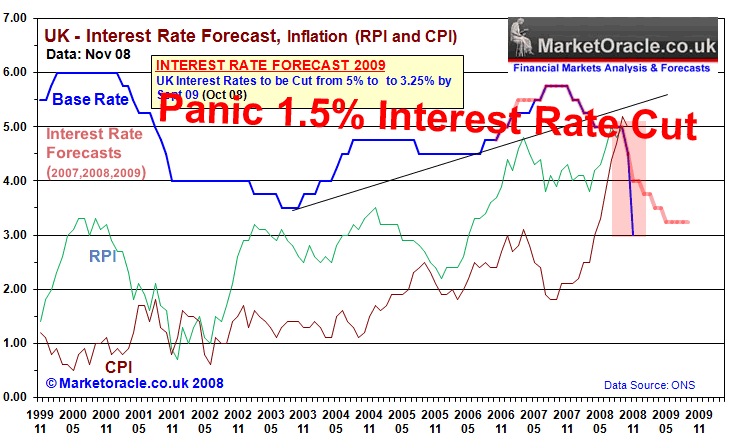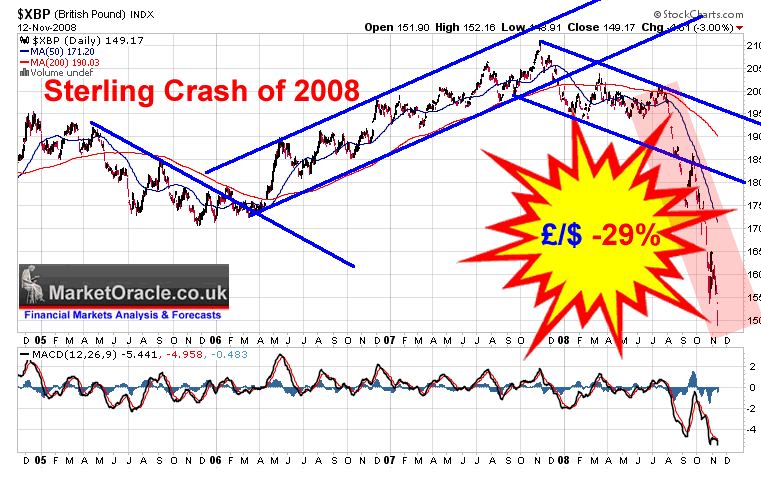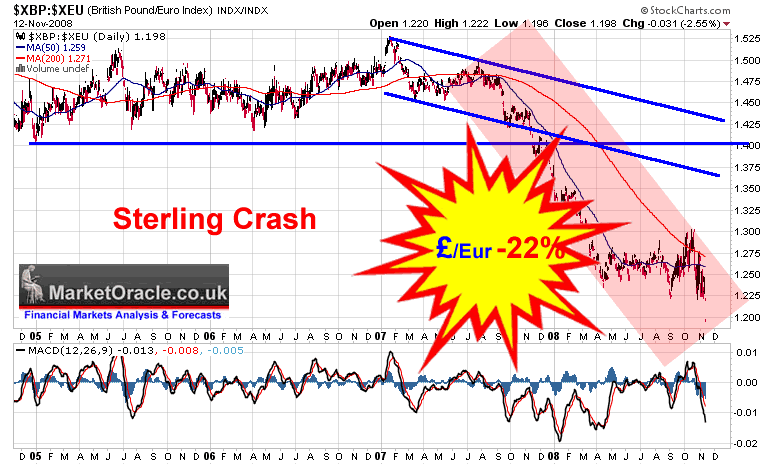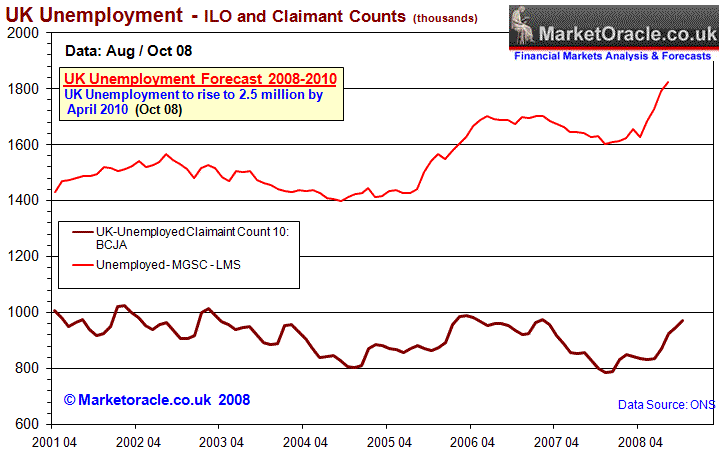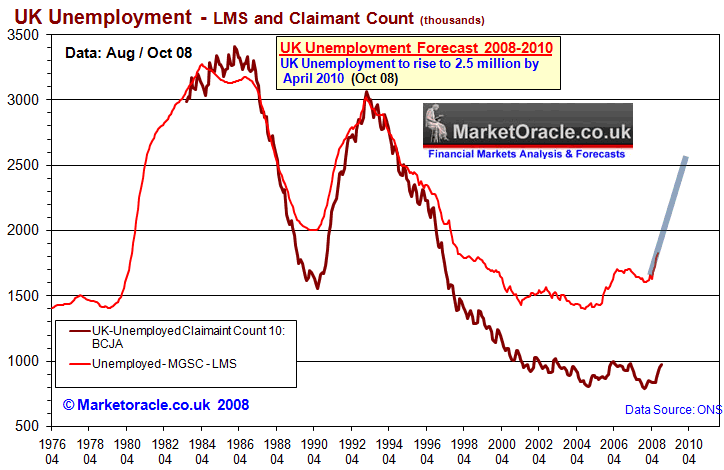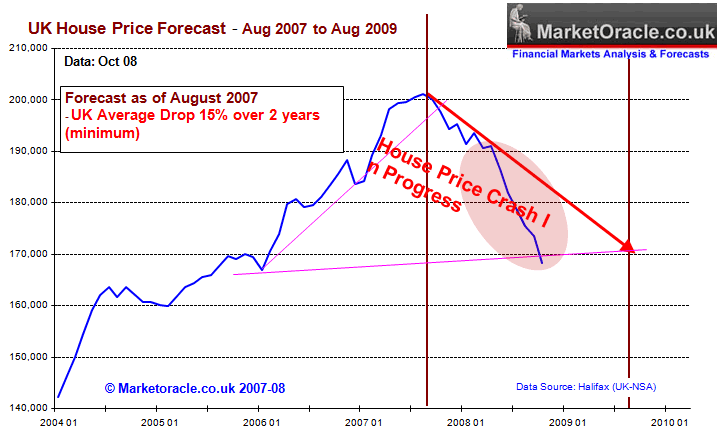British Pound Crashes to New Lows as Economy Heads for Deep Recession
News_Letter / UK Economy Nov 22, 2008 - 01:46 PM GMTBy: NewsLetter
 November 13th , 2008 Issue #37 Vol. 2
November 13th , 2008 Issue #37 Vol. 2
The foreign exchange markets are witnessing heavy and sustained selling of sterling which continues following the Bank of England's inflation report and statement on the economy. The British Pound has fallen below £/$1.50 to currently stand at 149.12, and to a new low against the Euro of 119. The fast developing sterling crisis illustrates the systemic failure of the Bank of England and Labour Government to manage both the economy and the credit crisis and marks another marker following last weeks panic interest rate cut of 1.5%, as the government took control of monetary policy back from the Bank of England and effectively ordered the Bank to cut interest rates by 1.5% despite inflation hitting 5.2%.
British Pound Crashes to New Lows as Economy Heads for Deep RecessionDear Reader, The foreign exchange markets are witnessing heavy and sustained selling of sterling which continues following the Bank of England's inflation report and statement on the economy. The British Pound has fallen below £/$1.50 to currently stand at 149.12, and to a new low against the Euro of 119. The fast developing sterling crisis illustrates the systemic failure of the Bank of England and Labour Government to manage both the economy and the credit crisis and marks another marker following last weeks panic interest rate cut of 1.5%, as the government took control of monetary policy back from the Bank of England and effectively ordered the Bank to cut interest rates by 1.5% despite inflation hitting 5.2%. Mervyn King through a number of TV interviews during the day set out to to reassure the financial markets as to why the Bank of England cut interest rates by a near unprecedented 1.5% last week instead of during the previous 6 months and why the Banks outlook has changed so much since the August report by stating. “We've reacted because the world has changed. The way we go about setting interest rates hasn't changed. I think it's worked well and I think it will continue to work well,” Unfortunately the more Mr King spoke the more investors dumped sterling as it became increasingly apparent that those at the helm of the UK economy are barely able to comprehend what is going on in the present let alone to attempt to competently manage and accurately forecast as to what is to transpire and what needs to be done. The governments response to the credit crisis and economic meltdown has been : 1. The £500 billion bank bailout package comprising £50 billion equity stakes, £250 billion loan guarantees and a further £200 billion in short-term liquidity injections. 2. Panic interest rate cuts that have seen rates cut by 2% in less than a month, falling from 5% to 3%. These are panic measures to a) prevent an deflationary economic depression and b) boost the economy in advance of the June 2010 general election deadline. Having first written about the perfect economic storm that Britain is now facing over 7 months ago, that perfect storm is now coming to pass as the currency crashes in the wake of unrestrained government borrowing, that sows the seeds for many years of stagflation following the impact of the asset price deflation. The Impact of the Crash in Sterling
For more guidance on how to survive the credit crisis and protect your money see the excellant free toolkit Interest Rates, Inflation and Deflation The Bank is now forecasting inflation will fall sharply during 2009 to below 1% CPI with the RPI measure going negative and pushing the economy into deflation during the year. However as we have witnessed with the perpetual 2% inflation forecasts in 2 years time, the Bank of England forecasts are consistently wrong. Similarly the Bank of England is now forecasting that the UK economy will contract sharply in 2009 by 2%, this is against the forecast made barely 3 months ago that stated that UK 2009 GDP growth would target 1%. It remains to be seen the degree to which these forecasts will also be revised further in 3 months time and during 2009 as has been the repeated tendency throughout 2008.
My existing forecast for UK interest rates to fall from 5% to 3.25% has now been fulfilled ahead of schedule following the Bank of England's panic interest rate cuts. Clearly with deflation on the horizon and an economic bust worse than the 1990's recession it does not take a genius to work out that UK interest rates are heading still lower, we will probably see interest rates of 2% or even lower by mid 2009, especially if negative RPI transpires as the next section elaborates upon. Deflation - Negative RPI and Government Debt The Bank is forecasting negative RPI next year, the importance of this is the fact that many pay deals and state benefits are linked to the RPI measure therefore a negative RPI implies that benefit payments will be cut next year, it will be interesting to see the public response, as it implies the UK is in store for civil unrest and worker militancy, especially amongst the public sector. Therefore in advance of 2010 Election the Labour government will increasingly cave in to public sector worker demands and push borrow far more than the current estimates and forecasts. Deflation has not been seen since the 1930's Great Depression. The effect of deflation are worse than inflation as a deflationary spiral brings investment to a halt and the value of debts increases in real terms as wages contract, leaving borrowers worse off than people have experienced during the recessions of the post war period. Long before the current crisis broke, way back in April 2008, I was forecasting that the UK would soon bust through the 40% GDP golden rule and lift borrowing to over 60% by the end of 2009 which would send sterling crashing. Following the £500 bank bailout I raised official UK debt surging to over 100% of GDP with similarly severe impact on sterling that had by then started to become apparent as sterling crashed through £/$1.80 down to £/$1.70. However it does look increasingly likely that Gordon Brown has now adopted the policy of bankrupting Britain in an attempt to win the next Election, which sets the scene for many years of economic stagflation to follow deflation. Currency Trends
Sterling has been heavily oversold for over 2 weeks, however despite this sterling continues to home in on the longer-term target of £/$1.37 which represents critical multi-decade support, below which would be parity to the US Dollar.
Chart courtesy of stockcharts.com Sterling's Break below 122.50 against the Euro to a new Euro all time low signals that the currency has entered a new downtrend that looks set to continue well into 2009. Soaring Unemployment Heading for 2million for Christmas The latest UK unemployment data released today showed unemployment soared by 140,000 in the 3 months to August, up 33,000 on the month and the number officially claiming unemployment benefit rose by 25,600 in October to 970,000. This was followed by the Bank of England's report on inflation and the economy that stated that UK is heading for 2% GDP contraction for 2009 which is significant change to the existing forecasts of growth for 2009. With a three month lag in published data, the actual unemployment rate looks set to pass above 2 million by Christmas to be released in March 2009. My UK unemployment forecast as the below graphs illustrate is for unemployment to rise to just above 2.5 million by April 2010, however a 2% GDP contraction forecast by the Bank of England for 2009 now implies that the UK is heading for a severe recession which implies UK unemployment could pass above 3,000,000 during the recession, this despite the fact that he unemployment statistics are heavily manipulated to under report true unemployment which would be some 6 million higher if all those of working age were included in the data. The real number of unemployed in the UK now stands at 7.9 million, up 15,000 in the three months to August.
UK House Price Crash Continues The most recent house price data released by the Halifax shows that UK house prices have fallen by more than 16% from the peak of August 2007 and October 2008. The crash in both US and UK housing markets over the last 12 months was increasingly followed in September by the bankrupt banks collapsing one by one like a chain of dominos with governments rushing to their rescue during September and early October to the tune of unheard of amounts of tax payers money that now runs to collectively over $3 trillion. This triggered the near panic co-ordinated interest rate cuts in October of 0.5%.
The current house price forecast is now complete, therefore I now intend on working exclusively towards completing in-depth analysis geared towards generating the next accurate forecast for UK house prices to cover the next 2 to 3 years, which despite the now pervading bearishness may still have a surprise or two in store. The Credit Crisis Survival Kit Elliott Wave International, the world's largest market forecasting firm, put together this free resource featuring 15 hand-picked reports and videos that will show you: Read All 15 and Download Your Free Credit Crisis Survival Kit Your analyst. Nadeem Walayat, Copyright © 2005-08 Marketoracle.co.uk (Market Oracle Ltd). All rights reserved. Nadeem Walayat has over 20 years experience of trading derivatives, portfolio management and analysing the financial markets, including one of few who both anticipated and Beat the 1987 Crash. Nadeem's forward looking analysis specialises on the housing market and interest rates. Attention Editors and Publishers! - You have permission to republish THIS article. Republished articles must include attribution to the author and links back to the http://www.marketoracle.co.uk . Please send an email to republish@marketoracle.co.uk, to include a link to the published article.For more in depth analysis on the financial markets make sure to visit the Market Oracle on a regular basis.
You're receiving this Email because you've registered with our website. How to Subscribe Click here to register and get our FREE Newsletter Forward a Message to Someone [FORWARD] To update your preferences and access the Newsletter archive [PREFERENCES] How to Unsubscribe - [UNSUBSCRIBE]
|
|||||||||||||
© 2005-2022 http://www.MarketOracle.co.uk - The Market Oracle is a FREE Daily Financial Markets Analysis & Forecasting online publication.



